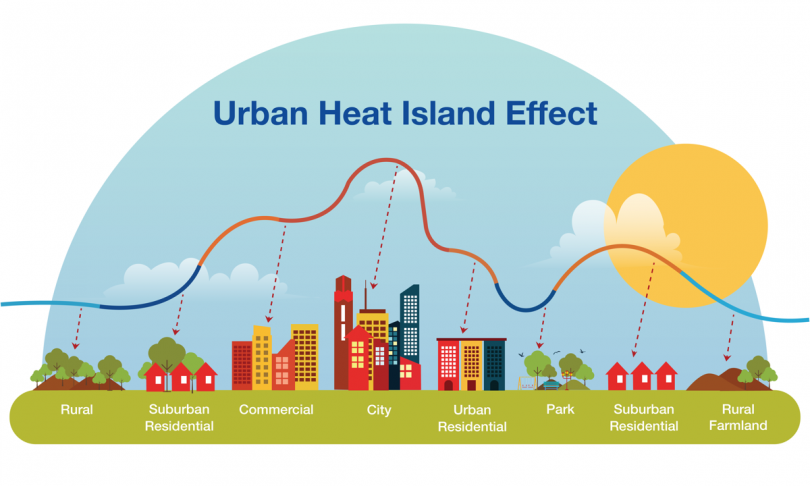Urban Heat Island Effect

- 31 May 2024
Why is it in the News?
Large parts of the country are witnessing a searing and longer-than-usual heatwave, with record-breaking day temperatures.
What is an Urban Heat Island?
- An urban heat island occurs when a city experiences much warmer temperatures than nearby rural areas.
- The difference in temperature between urban and less-developed rural areas has to do with how well the surfaces in each environment absorb and hold heat.
What is the Urban Heat Island Effect?
- Structures made of concrete — buildings, pavements, roads, and other infrastructure — absorb and re-emit the sun’s heat more than natural features like trees and water bodies.
- Cities, where these structures are concentrated, and greenery is limited, thus become “islands” of higher temperature compared to surrounding, greener, areas.
- This is called the urban heat island effect. And since heat is trapped in built-up structures, greater urbanisation has a direct correlation with the rise in night temperatures.
How do humidity and warm nights impact the human body?
- The rise in temperatures, humidity, and warmer nights together make the summer more deadly for human beings.
- Humans regulate their body temperatures by sweating, the evaporation of sweat from the skin cools our bodies.
- However high humidity prevents this from happening, which can take a toll on the body.
- Reacting to heat, “the heart starts pumping more blood to our skin.
- This activates the sweat glands which help regulate body temperature.
- But as a result of sweating, other organs get less blood flow.
- In humid conditions, the body continues to sweat with little avail.
- This not only leads to dehydration and salt imbalances but also takes a toll on organs due to reduced blood flow.
- And it leads to the body overheating as its temperature-regulation mechanism is not working.
- If the temperatures are too high, the cellular processes in the brain also get affected.
- This can initially lead to fainting, and in more serious cases, effects such as heat stroke and organ malfunction.
At the very basic level, more humidity and warmer nights do not allow our bodies to rest and recuperate”.
